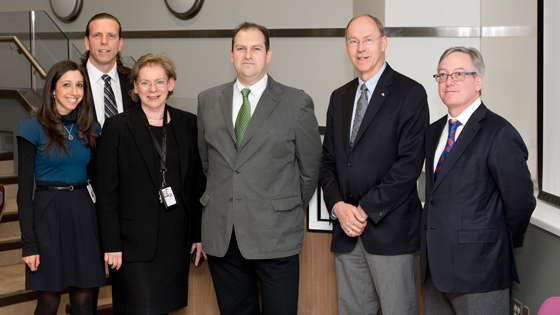
At the Feb. 5 launch of the Global Task Force on Radiotherapy for Cancer Control hosted at Princess Margaret (from left to right): Danielle Rodin, David Jaffray, Mary Gospodarowicz with David Collingridge, Editor, The Lancet Oncology;
Jake van Dyk, Professor Emeritus, Western University; Michael Barton, Professor, Radiation Oncology, University of New South Wales. (Photo: UHN Photographics)
Princess Margaret Cancer Centre is leading a new international Global Task Force on Radiotherapy for Cancer Control (GTFRCC) to tackle lack of access to treatment in countries that most need it.
Dr. David Jaffray, Head, UHN Radiation and Imaging Physics and Director, Techna Institute, is leading the GTFRCC Secretariat, which was officially announced Feb. 5 at the cancer centre on behalf of the Union for International Cancer Control (UICC). Miller MacPherson, a physicist in the radiation medicine program, is the Secretariat Director, Operations. The Toronto Operations group includes Drs. Mike Milosevic, Brian O'Sullivan and Danielle Rodin -- a radiation oncology resident who is leading a new Young Leaders Initiative for GTFRCC -- and Tracey Lui, Techna Network Coordinator.
Shortfall in radiotherapy worldwide
The mandate of the GTFRCC, with 90 members representing 30 countries, is to assess the shortfall in radiotherapy worldwide to raise awareness, facilitate planning, attract investment and improve access to this powerful, effective and critical component of cancer treatment. Findings and recommendations will be presented at the World Cancer Congress in December in Melbourne.
"Radiation therapy is an essential tool in the cure and palliation of cancer, and is indicated in more than half of new cancer patients, but there is huge health care disparity among nations," said Jaffray. "The cancer burden is growing fastest in those countries that are the least prepared to deal with it."
Achieving global health equity
In Africa, for example, 29 of 52 nations, with a total population of 198 million, have no radiotherapy facilities at all. Worldwide, cancer deaths are expected to double between 2008 and 2030 to about 15 million deaths, with 70% of deaths occurring in lower- and middle-income countries.
Dr. Mary Gospodarowicz, Medical Director, Princess Margaret Cancer Centre, and currently President, UICC, said: "As leaders in radiotherapy, we have a significant opportunity to truly have global impact in addressing this major issue of investment in health equity."
To find out more about GTFRCC, please visit www.gtfrcc.org.
